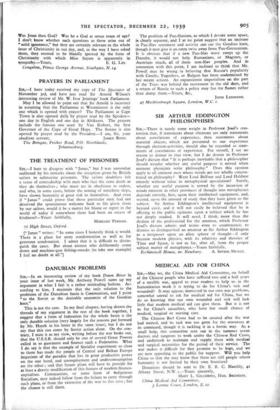SIR ARTHUR EDDINGTON PHILOSOPHISES
Sta,—There is surely some weight in Professor Joad's con- tention that, if statements about electrons are only statements about correlations of experience, then statements about material objects, which are presented to our experience through electron-activities, should also be regarded as state- ments of correlations of experience. For myself, I see no reason to demur to that view, but I do demur to Professor Joad's dictum that " It is perhaps inevitable that a philosopher should wonder whether any useful purpose is served when eminent physicists write philosophy." Does this opinion apply to all eminent men whose minds are not wholly concen- trated on philosophy? Were Lord Balfour and Lord Haldane entirely without value in metaphysical speculation? Surely, whether any useful purpose is served by the incursion of minds eminent in other provinces of thought into metaphysics depends entirely, first, upon their intellectual equipment, and, second, upon the amount of study that they have given to the subject. Sir Arthur Eddington's intellectual equipment is beyond cavil, and it will not easily be believed that he is offering to the public opinions upon a subject which he has not deeply studied. It will need, I think, more than the disdain of the professional for the amateur, which Professor Joad's dictum admits and seems even to countenance, to dismiss so distinguished an amateur as Sir Arthur Eddington as a trespasser upon an alien sphere of thought—if only because modern physics, with its relativity and theories of Time and Space, is not so far, after all, from the proper subject matter of metaphysics.—Yours faithfully, Ecchinswell House, nr. Newbury. A. IRVING MUNTZ.




































 Previous page
Previous page